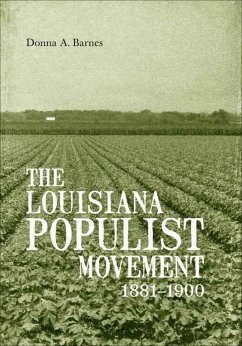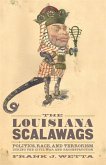The Populist movement of the late nineteenth century represents one of the largest third-party challenges in American history. Throughout the South widespread drops in crop prices led to agrarian revolt, which contributed to the movement's popularity. Yet, in the largely rural state of Louisiana, despite the political group's focus on empowering distressed farmers, this challenge proved far less successful. In Donna A. Barnes's The Louisiana Populist Movement the question of ineffectuality makes an intriguing political case study of the Pelican State and Populism.
Emerging in the 1890s as the political wing of the Southern Farmers' Alliance, the Populists, or People's Party, garnered the support of millions of rural southerners. But the affiliated Louisiana party struggled to spread beyond a limited number of parishes in the northern and central part of the state. According to Barnes, the movement's relatively poor mobilization record provides an excellent opportunity to explore factors that impede social growth. Most scholars, she contends, often focus on the emergence and rise of successful political organizations and overlook the valuable observations to be found within less successful movements, such as Louisiana Populism.
In her evaluation, Barnes points to racial division as the factor that undermined the Populist cause in Louisiana. The Democratic Party saw the agenda of the Populist movement as a threat to white supremacy and thus, when paired with the 1898 state constitution that disfranchised poor rural whites and most blacks, predestined the People's Party to poor public reception.
Based on an array of archival research, Barnes's study offers the definitive source for the history of the Louisiana Populist Movement as well as a multidimensional theoretical analysis of the factors behind the movement's failure.
Emerging in the 1890s as the political wing of the Southern Farmers' Alliance, the Populists, or People's Party, garnered the support of millions of rural southerners. But the affiliated Louisiana party struggled to spread beyond a limited number of parishes in the northern and central part of the state. According to Barnes, the movement's relatively poor mobilization record provides an excellent opportunity to explore factors that impede social growth. Most scholars, she contends, often focus on the emergence and rise of successful political organizations and overlook the valuable observations to be found within less successful movements, such as Louisiana Populism.
In her evaluation, Barnes points to racial division as the factor that undermined the Populist cause in Louisiana. The Democratic Party saw the agenda of the Populist movement as a threat to white supremacy and thus, when paired with the 1898 state constitution that disfranchised poor rural whites and most blacks, predestined the People's Party to poor public reception.
Based on an array of archival research, Barnes's study offers the definitive source for the history of the Louisiana Populist Movement as well as a multidimensional theoretical analysis of the factors behind the movement's failure.
Dieser Download kann aus rechtlichen Gründen nur mit Rechnungsadresse in A, D ausgeliefert werden.









